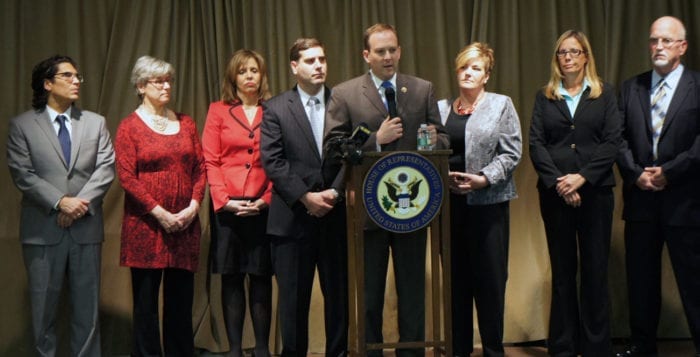Billion dollar drug abuse bill sent to President’s desk

Major change may be coming to the North Shore, as a drug abuse bill is set to land on U.S. President Barack Obama’s (D) desk this week.
U.S. Rep. Lee Zeldin (R-Shirley) is a co-sponsor of the Comprehensive Addiction and Recovery Act of 2016, which plans to spend $8.3 billion to help combat widespread drug addiction, especially addiction to heroin, on Long Island.
“As addiction and overdose deaths continue to climb, tearing families apart, it is essential that the President sign CARA into law to start delivering help to those suffering,”
— Lee Zeldin
CARA passed through the House of Representatives last week with a bipartisan vote of 407 to 5, and the Senate this week with a bipartisan vote 92 to 2.
Zeldin, who is a member of The Bipartisan Task Force to Combat the Heroin Epidemic, said he has been a proud supporter of this bill for more than a year now, and is happy to see Congress backing it.
“With both House and Senate passage of CARA, a bill that I proudly cosponsor, we are now only one step away from this bill being signed into law,” Zeldin said in a statement. “78 people [lose] their life every day as a result of an opioid or heroin overdose. Last year — on Long Island alone — 442 people died of a heroin or opiate overdose, up from 403 overdose deaths the year before. As addiction and overdose deaths continue to climb, tearing apart families and communities, it is essential that the President sign CARA into law to start delivering help to those suffering.”
The specifics of CARA include $80 million in funding to help prevent and treat addiction on a local level through community-based education, prevention, treatment and recovery programs; $160 million for the expansion of medication-assisted treatment options; and $103 million to establish a community-based competitive grant program to address and treat the problems of heroin and opioid addiction and abuse. Additional funding will help supply po lice forces and emergency medical responders with higher quantities of naloxone, known more commonly as Narcan, a medication that is proven to reverse an opioid overdose.
Another part of CARA’s funding focuses on pain management and prescription.
According to the bill, the Department of Health and Human Services is required to assemble a Pain Management Best Practices Inter-Agency Task Force, which will review, modify, and update the best practices for pain management and prescribing pain medication, and examine and identify the need for, development, and availability of medical alternatives to opioids.
The grant aspect of CARA is connected to the Omnibus Crime Control and Safe Streets Act of 1968. CARA is set to amend that bill to authorize the Department of Justice to award grants to state, local and tribal governments to provide opioid-abuse services, including enhancing collaboration between criminal justice and substance abuse agencies; developing, implementing and expanding programs to prevent, treat, or respond to opioid abuse; training first responders to administer opioid overdose reversal drugs; and investigating unlawful opioid distribution activities.
The North Shore is not immune to the heroin crisis. According to a New York State Opioid Poisoning, Overdose and Prevention Report from 2015, Suffolk County has the highest heroin-related overdose fatalities of any county in New York.
Zeldin has co-sponsored several other bills in the House on this issue.
“While there is not just one piece of legislation that will solve this crisis, we must always continue our fight to provide our local communities with the resources necessary to help stop and prevent drug abuse through treatment, enforcement, and education,” he said.






